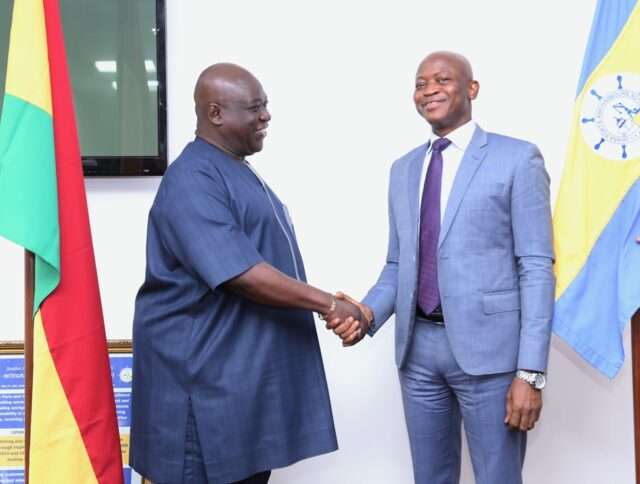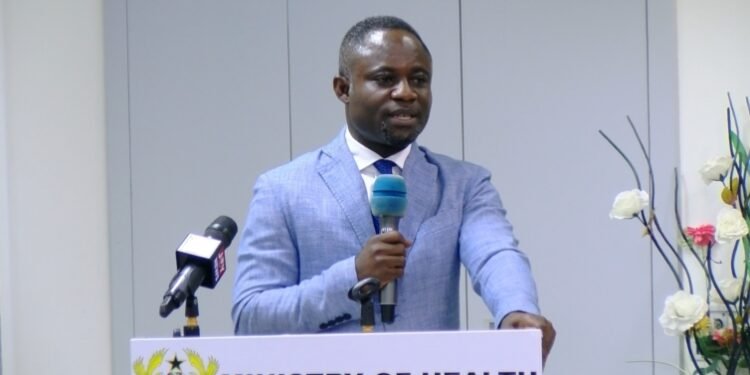Dr Fareed Arthur, National Coordinator, AfCFTA Coordination Office, has underscored the potential of the Volta region of Ghana, noting that the region is on the right pathway for economic breakthrough under the auspices of the African Continental Free Trade Agreement (AfCFTA).
Dr Fareed Arthur noted that the region is strategically well-positioned and in proximity to the West African enclave which will help the region economically.
The AfCFTA Coordinator indicated that Intra-African trade constituted only 12-15 per cent and three per cent of world trade, while intra-American and intra- European trades accounted for some 60 and 57 per cent.
Dr Arthur states that India and China harnessed their human and other resources to create the enabling global markets on all fronts and Africa with its resources would rake in some US$3.5 trillion in Gross Domestic Product, with some recent estimates pointing to US$7 trillion when the informal sector is added.
Dr Arthur espoused the journey, leading up to the signing and ratification the AfCFTA agreement with Ghana playing crucial roles, including being the first country to sign the document. He disclosed that 54 out of 55 countries have signed the agreement, with 47 state parties ratifying and with Ghana playing host to the headquarters of AfCFTA, denoting it as the commercial gateway to the continent.
Dr Arthur noted that the AfCFTA NCO is sensitising stakeholders to facilitate participation and trade among businesses with varied unique potential to be harnessed.
Dr Arthur made this known during the Volta Regional Conference and Stakeholder Engagement on the Implementation of the African Continental Free Trade Agreement (AfCFTA) in Ho.
It was organised by the National AfCFTA Coordination Office, Ministry of Trade and Industry, Regional Coordinating Council, and partners.
Approach Adopted By Government
Mr Jacob Gyamfi-Aidoo, Senior Advisor, Capacity Building and Stakeholder Engagement of NCO, on his part, said the government and its partners are adopting an inclusive, deliberate and intentional approach to bring everyone on board.
Mr Gyamfi-Aidoo noted that the implementation of AfCFTA required a multi-stakeholder engagement, collaboration and effective coordinating national NCO anchored on its seven components, 24 policy objectives, 37 policy prescription, 69 outputs and 55 implementation agencies.
Dr Archibald Letsa, Volta Regional Minister, also said the platform would create a more vigorous collaboration between all key stakeholders “so that we can, in unison, create a more enabling environment to attract and boost free trade by establishing a mutually beneficial trade agreement among the relevant entities.”
Dr Archibald Letsa asserted that the success of these partnerships would lead to employment generation, technology transfer, improved trade and higher levels of revenue generation for the benefit of citizens.
Dr Letsa noted that the downward productivity in agriculture, financial technology, IT and in the creative industry, among others, obviously showed the low economic activities in the region, reflecting in low exports and job creation. He commended the Ministry of Trade and Industry for their initiative to bailout businesses with tailor-made products for all to succeed. “There is, therefore, the need to encourage more public-private partnerships and linkages to actualise the gains of the AfCFTA,” Dr Letsa said.
Mr Augustus K. Awity, Volta Regional Coordinating Director, giving an overview of industries being targeted said it will include 499 farm-based industries, 219 agro industrial, 419 primary fabricated and repairs, 1,778 traditional craft and 2,751 agro-processing industries.
Awitty noted that AfCFTA has a comparative advantage of open and growth of small-scale businesses, encouraged industrialisation in the region, foster competition in manufacturing, elimination of tariffs, settling of disputes, creation of single market, eliminate trade barriers, protects intellectual property rights, as well as economic boost and trade diversification.
Awity enumerated challenges including limited access to finance by SMEs especially trade finance, network infrastructure in terms of rail, road and air transport as well as internet penetration, power supply, deficiency in human and technological capacity of SMEs as the problems facing the region.
Mr Awity noted that though the challenges are many and would take longer time to be resolved, the region could redeem itself by taking advantage of the AfCFTA and called for more sensitisation programmes in the Municipalities and Districts.
READ ALSO: U.S, Russia Have Touched On The Issue Of Prisoner Swap Involving Gershkovich- Peskov






















